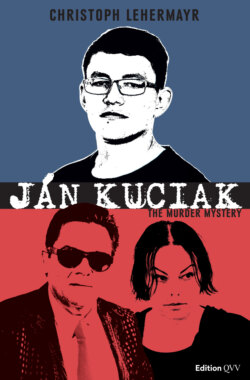Читать книгу Ján Kuciak - Christoph Lehermayr - Страница 11
На сайте Литреса книга снята с продажи.
“Janko fought for all of us”
ОглавлениеTen days have passed since the double murder. At the end of a narrowing valley, a few houses and then a village appear: Štiavnik, Ján Kuciak’s hometown, first mentioned in 1439 in a document by Albert II of Habsburg. Low houses crowd along the only broader road. Dense beech forest begins behind them. Bratislava is 200 kilometres and half a world away. In the church, people sit crowded tightly together in the pews, while many more stand stunned outside. An hour before the funeral mass begins, old women from the village murmur rosaries. It’s a weeping, plaintive memento, interrupted by loud sobbing coming from the chapel of rest. There, his parents, his sister and his brother watch over Ján Kuciak’s body in the open coffin. He lies in the suit he would have worn at his wedding. Just like his fiancée in her white wedding dress at her funeral three days before. TV teams from all over the world take their positions in front of the grave decorated with green satin and white roses. They film the deep burial trench. As the bells strike dully and insistently, the coffin sinks into the darkness. Marek Vagovič, Kuciak’s boss, speaks later. Like several of his investigative colleagues, he’s been under around-the-clock police protection since the murder became known, and he says, “Ján was so young, so full of ideals, with his whole life ahead of him. He believed that he would one day live in a country which is not led by corrupt politicians and mafiosi with white collars. Ján fought against it every day, occupying the police, the prosecutors and the courts. Thanks to his exceptional talent he quickly made himself a large circle of enemies. Nevertheless, he didn’t let himself be intimidated, because he didn’t do it for himself, not for fame nor money. Janko fought tirelessly for all of us, so that we could live better and sleep more soundly. We must not give up now. We must keep working the way Ján would have wanted us to, to seek the truth and to overcome fear. His courage should be our inspiration and our obligation.”
Commemorating the murdered journalist and his fiancée
Photo: Ricardo Herrgott
Who wanted Ján Kuciak to die? And why? Who crossed that final threshold of rational human behaviour and believed that the only way to stop a journalist was to pay men to kill him? How could the instigator or instigators believe that they could get away with an execution like this in the heart of Europe? Were they, the individuals behind the murder, relaxed, relieved and reassured after the killer had done his work? What was Ján Kuciak hiding that cost him his life? And why were the perpetrators willing to accept the killing of his fiancée with him, as if she were just collateral damage of their crime?
The investigations which followed the double murder brought the unimaginable to light. They lead to a story of power and its abuse, to servility and sex, to a mafia-like network that committed murders and planned more. A system comes to light which has been infiltrated and hollowed out by crime, privatised and instrumentalised by criminal groups whose tentacles reach deep into the judiciary, the police and to the top of politics. If all this was just the plot for a Hollywood political thriller, the producers probably would have thrown the script back – too unfathomable, too abstruse, too much of everything. But it is the truth, and it offers a rare, intimate glimpse inside a system – because this was a political murder. Ján Kuciak and Martina Kušnírová had to die because they lived in a mafia state.
